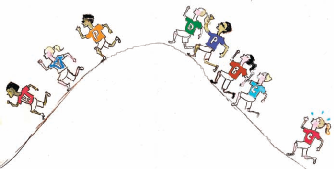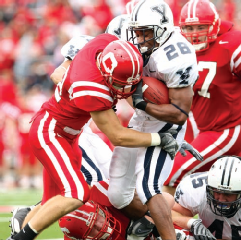Financial aid policies threaten Ivy League competitive balance
Financial aid policies threaten Ivy League competitive balance
F or many students, recent changes in the financial aid policies of the Ivy League schools have been good news. For Cornell Athletics, they aren't.
or many students, recent changes in the financial aid policies of the Ivy League schools have been good news. For Cornell Athletics, they aren't.
"If a family has income of $200,000 or less, the maximum they will pay at Harvard is 10 percent of that number," explains Cornell athletic director Andy Noel. "But unless there are unusual circumstances, a student with family income of $200,000 is probably not going to get any financial aid at all from Cornell. So to say that the playing field is not level is an understatement."
The improvements in financial aid at Ivy schools have been big news since last year, when Harvard announced that it was eliminating loans and greatly reducing the contribution expected from middle-class families. Princeton already had a no-loan policy, and Yale soon followed suit; before long, Cornell announced that it would eliminate loans for undergraduates with family income up to $75,000 and cap need-based loans at $3,000 per year for students with family income between $75,000 and $120,000. While this is significantly better than the University's previous financial aid policy, it falls far short of what's being offered by Harvard, Yale, and Princeton.
These new policies apply to all students with financial need, not just athletes, but aid policies have a dramatic and visible effect in sports, where changes in the student body can be seen on the field—and the scoreboard.
For a student-athlete being recruited by both Cornell and Harvard, the difference in aid can be stark. "We've seen differentials that range from $20,000 to $100,000 over four years," says Noel. "That's a huge challenge for us, and it's already hit some sports—hockey, for instance—hard." Men's hockey head coach Mike Schafer '86 confirms this. "In the past couple of years, we've missed out on seven or eight kids," he says. "Cornell was their first choice, but the financial aid just wasn't competitive."
For many years, Ivy League administrators met annually to compare the aid offers to students who had been admitted at two or more schools. These "Ivy Compare" conferences allowed schools to adjust their offers so students would not choose where to matriculate based strictly on finances. But the Department of Justice objected to this practice, saying it violated antitrust laws, so in 1993 the Ivy League voluntarily discontinued the meetings. While the eight schools have continued to agree that all aid should be need-based— and thus there are no athletic scholarships or other merit-based aid—each institution has otherwise been free to set its aid policies. An additional factor came into play early this year when Congress began to scrutinize universities with large endowments and suggest that the government might intervene unless these funds were used to benefit students more directly.
Determining financial aid policy is a complex issue, and administrators must weigh many factors, including the size of the student body, the endowment, and a host of competing priorities, from faculty retention to scientific research to paving parking lots. "Harvard, Yale, and Princeton are doing what they think is right," says Susan Murphy '73, PhD '94, vice president for student and academic services, "and they have the resources to do it." But the application of more of these resources to financial aid for student-athletes, she acknowledges, has created a problem for Cornell, which simply does not have the funds to match every offer.
This has put Cornell at a distinct competitive disadvantage, says Noel. He fears that the recent championships in basketball, lacrosse, track, and other sports may one day be seen as the end of an era, because the best student-athletes will soon be concentrated at Harvard, Yale, and Princeton. "If our students are lining up against these schools and have little chance to be successful, that's not fair to our students," he says. "Some people think I'm overstating this problem, but I'm not. Within three years, there will be such an impact on our competitive success that folks will ask me why I didn't do something to prevent it."
Jeff Orleans, executive director of the Ivy League, says that "shared competitive success is a basic principle of the league, and we are always concerned when there are significant changes in admissions and financial aid that could have an effect on competitive balance." He confirms that there have been informal talks among the Ivy presidents about these issues and says that a "more structured discussion" is planned for later this year.
What can Cornell do? That's being investigated, says Murphy. One short-term solution would be to allocate funds so Cornell could match scholarship offers from other Ivy schools. While this could not be done across the board, it might be possible in a limited number of cases. Cornell also has to expand its recruiting, adds Murphy, reaching out to student-athletes in different areas and different populations. This strategy has proven effective for the basketball program, which recruited excellent players from the Midwest and beyond—and won both the men's and women's Ivy League championships last year. Whether it will work in other sports, many of which have very small pools of recruits who qualify for Ivy admission, remains to be seen.
Perhaps, says Schafer, Cornell will have to limit its recruiting to only the student-athletes whose families can pay full price for their education. "But," he says, "that would seem to go against the founding principle of the University—that 'any person' can study at Cornell." — Jim Roberts '71
Big Game
September 27, 2008
 On a rainy Saturday afternoon, a Homecoming crowd of 11,000-plus cheered on the Big Red to one of their biggest football wins since Jim Knowles '87 became head coach in 2004. The Cornell team—which scored first and never relinquished the lead— claimed a 17-14 victory over Yale, preseason co-favorites (with Harvard) to win the Ivy title. The Eli could not get their vaunted running attack going on Schoellkopf's new FieldTurf surface, finishing the game with zero yards on the ground. Their passing game didn't fare much better, with only 209 yards gained and one interception, which led to a Cornell score. The Big Red defense used a variety of formations and blitzes to confound the New Havenites, and defensive lineman Graham Rihn '09 blocked a kick for the second week in a row. After the game, Yale head coach Jack Siedlecki said, "They kept us off balance all day."
On a rainy Saturday afternoon, a Homecoming crowd of 11,000-plus cheered on the Big Red to one of their biggest football wins since Jim Knowles '87 became head coach in 2004. The Cornell team—which scored first and never relinquished the lead— claimed a 17-14 victory over Yale, preseason co-favorites (with Harvard) to win the Ivy title. The Eli could not get their vaunted running attack going on Schoellkopf's new FieldTurf surface, finishing the game with zero yards on the ground. Their passing game didn't fare much better, with only 209 yards gained and one interception, which led to a Cornell score. The Big Red defense used a variety of formations and blitzes to confound the New Havenites, and defensive lineman Graham Rihn '09 blocked a kick for the second week in a row. After the game, Yale head coach Jack Siedlecki said, "They kept us off balance all day."
Sports Shorts
JUMP START The men's basketball team will begin their quest for another Ivy League title by playing in the NIT Season Tip-Off Tournament for the first time. The ninth-seeded Big Red will face eighth-seeded St. John's University in the first round of the East Regional at Boston College on November 17. The regional final will be held the next night, with the winner advancing to the semifinals at Madison Square Garden on November 26. ESPN will provide coverage.
 HIGH HOPES Big Red wrestling fans expect big things this season, and W.I.N. Magazine agrees. The publication placed Cornell third in its preseason tournament power ratings and fourth in the pre-season dual meet ratings. Seven Big Red wrestlers were named to the top 10 in their respective weights, including Jordan Leen '09 (the nation's top-ranked wrestler at 157 pounds), Mack Lewnes '11 (ranked second at 165), and Steve Anceravage '09 (ranked fourth at 174).
HIGH HOPES Big Red wrestling fans expect big things this season, and W.I.N. Magazine agrees. The publication placed Cornell third in its preseason tournament power ratings and fourth in the pre-season dual meet ratings. Seven Big Red wrestlers were named to the top 10 in their respective weights, including Jordan Leen '09 (the nation's top-ranked wrestler at 157 pounds), Mack Lewnes '11 (ranked second at 165), and Steve Anceravage '09 (ranked fourth at 174).
GALAXY QUEST In August, Bruce Arena '73 was named general manager and head coach of the Los Angeles Galaxy of Major League Soccer. The Galaxy are considered the league's flagship franchise and feature English superstar David Beckham. Arena, the former head coach of the U.S. National Team, will be joined on the Galaxy's staff by Dave Sarachan '76, who will serve as an assistant coach. Sarachan guided the Big Red men's team from 1989 to 1998 and was Arena's assistant with the national team.
NEW COACHES This fall, Cornell Athletics welcomed a bevy of new coaches. Bill Walkenbach '98 takes over as head baseball coach after seven years as a Big Red player and assistant coach and three seasons as head coach at Franklin & Marshall College. The crew program has two new coaches: Chris Kerber, who was named the lightweight head coach (replacing Todd Kennett '91, who was promoted to director of the rowing program), and Matt Smith, the new heavyweight freshman coach. David Geatz is now the head coach of men's tennis; he led the University of Minnesota men's team to five league titles. And over at Lynah Rink, Casey Jones '90 has returned to campus as associate head coach of the men's hockey team. Jones, captain of the 1989-90 Big Red squad, spent the last 13 seasons as an assistant coach at Ohio State.
HORSE SENSE Former women's polo player Janet Durso '83, DVM '89, and her husband, Ray Schnittker, are among the owners of Deweycheatumnhowe, a three-year-old standardbred racehorse that became the first undefeated winner of the Hambletonian, harness racing's most prestigious event. Named after a comedy routine about a crooked law firm, the colt covered the mile at the Meadowlands in 1:52.0. In addition to being owners, Durso is the horse's veterinarian while Schnittker is its trainer and driver.


